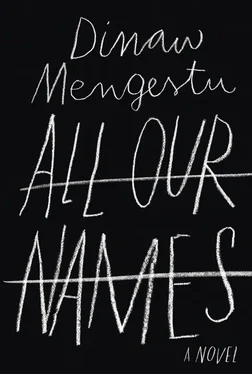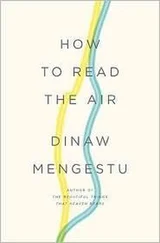“After he hung up the phone, we sat silent for a long time. I thought of my friend, who was alive but was unlikely to live much longer, while Henry debated what to do with me next.
“After almost an hour had passed, Henry said, ‘I don’t want to know anything else about you before you came here. As far as I’m concerned, you were born this morning, and your name is Isaac. That’s the most I can do for you.’
“We began to like each other immediately after that. I was no longer a problem to be solved. He had no one to save or feel guilty toward, He asked me what I did in my spare time. I had never heard that expression. ‘What do you do for fun?’ he said.
“I told him I read Dickens. He loved that. He said he thought my accent sounded vaguely British. ‘Dickens was the only good thing to have come out of England in a hundred years,’ he said. Later that evening, he gave me advice about how to live in America. He told me not to stare at white people, to say ‘sir’ if I was stopped by the police, and to live as quietly as possible.
“ ‘This is a hard part of the country to have come to,’ he said. ‘You might wish you hadn’t.’
“ ‘I will be fine,’ I told him. ‘I will live as if I am not really here.’
“When you and I became close, I still believed that was true. I thought the less I said the better.”
“For you or for me?”
“For both of us.”
“David said you must have done something terrible in your previous life to tell me so little about yourself. I never told him that I had doubts about your name. He would have begged me never to see you again if I had, which is probably why I never told him. I don’t understand how you can live like this. My whole life is here, and if I left I’d probably always think of myself as Helen from Laurel.”
“I understand. I had the same once, and I did my best to escape it. When I was born, I had thirteen names. Each name was from a different generation, beginning with my father and going back from him. I was the first one in our village to have thirteen names. Our family was considered blessed to have such a history. Everyone in our family had been born and died on that land. We fed it with our bodies longer than any other, and it was assumed I would do the same, and so would my children. I knew from a very young age, though, that I would never want that. I felt as if I had been born into a prison. We had one horse and a mule, which my father and I used to ride through the fields. It was beautiful land that had not changed in hundreds of years. We used oxen to plow it, and I knew if I stayed there my life would be no different from theirs. I begged my father to send me away to school, but he said my mother would never forgive him if he did, so I made my own plans to leave. I must have been thirteen or fourteen at the time. I never had many friends, and I had even fewer as I grew older. I was secretly preparing for my departure. I gave myself different names, which I copied into a notebook that I later burned. I practiced my English on the back of a mule and read what few books we had dozens, maybe hundreds of times.
“I stayed years longer than I had hoped to. There was a drought; we became even poorer. I began to believe the best part of my life had been spent dreaming. We heard rumors of soldiers revolting in the south of the country, but it meant nothing where we lived. Then men who weren’t soldiers, who were the same age as me but had gone to university, began to visit our village. They held meetings that no one attended. Eventually, they came to our house and asked us if we thought it was fair that we should be so poor while the rulers of the country lived like kings in Addis Ababa. They promised us a socialist revolution, and asked me to come with them. The next day, my father said it was time for me to leave.
“ ‘I don’t want you to stay here,’ he said. ‘If your brothers were older, I would send them with you.’
“He believed something terrible was going to happen to the country soon, and I suspect he is right. It hasn’t happened yet, but I doubt it will be much longer now.
“When I left, he held me for a very long time. He used to call me Bird when I was a child. He said I lived high in the sky, far above everyone else.
“ ‘You’ll come back,’ he said.
“ ‘Of course,’ I told him.
“I thought he was going to tell me to write. Instead, he kissed me four times, twice on each cheek.
“ ‘No, my little bird,’ he said. ‘I know you won’t.’
“I went to Addis Ababa, and then took buses to Kenya and Uganda. I was no one when I arrived in Kampala; it was exactly what I wanted.”
That was the first night of Joseph’s war. The small arms hidden in the wheelbarrow ended up in the hands of the seven boys I had been confined with. Shortly after Isaac and I left the house, they began to kill the soldiers patrolling the neighborhood, one at a time. Those boys had the advantage at the beginning: It was their home. They knew where to hide and where to shoot from.
The soldiers fired back recklessly, blindly, in multiple directions at once. For every one that was hit, hundreds of shots were fired in return, not just down the streets but through windows, doors, and walls, regardless of who might be on the other side of them. Most of the dead died during that first hour, but Isaac and I weren’t concerned with them. We listened to the fighting from a corner of the living room least likely to catch a stray bullet. Once there was a lull, we turned on each other.
I began with what I thought was the most pressing question: “How long were you at the house?”
“Twenty minutes,” he said, “maybe less.”
“And what would have happened if you hadn’t come?”
“How can I know that?” he said. “I did come.”
“Why?”
“Why did I come?”
“Yes.”
“I was worried.”
“Did Joseph tell you to?”
“He was concerned as well.”
“That’s not what I asked you.”
“What do you want me to say? I’m here.”
We ended on a loop. I had my doubts, every one of which Isaac could reject simply by pointing out that he was there, and I was alive, and both of us were in danger. He was carrying a gun of his own now — a black pistol with a snub nose, clipped to his belt. When we finished arguing, we had the fighting to return to. The silence had gone on too long; Isaac was growing restless.
“They can’t all be dead already,” he said.
A few seconds later, we heard a single shot. We were both relieved, although for different reasons. I thought I saw Isaac whisper, “Thank God,” but it could have also been “My God,” or “Oh God.” Regardless, the heavy firing that followed was a good thing.
Isaac taught me how to read the fighting. The automatic weapons belonged to the government; the rifles were ours. “Our boys are more careful,” he said. They were roaming the streets and roofs alone, or in pairs. They waited until they had an easy shot and then fired once, twice at most, before running off to another spot.
“Aren’t they too young?” I asked him.
He laughed.
“They were in uniform until this morning,” he said.
We knew when the first boy was killed because the soldiers started shouting. They cheered and fired into the air, and most likely again at the body. They did the same when the second died, a few minutes later, although this time a low, steady chant followed. The third wasn’t killed until an hour later — a small miracle, given that soldiers from all across the capital had poured into the neighborhood and were occupying almost every corner. We saw the vague outlines of their forms running past the house. That was when Isaac took his pistol out and placed it on the floor next to him. The fighting needed to start again. As long as those four boys were hiding, everyone in the slum was vulnerable. We heard screams and shots from far away. These quickly became regular. Isaac whispered into my ear, “They’re going door to door now.”
Читать дальше












